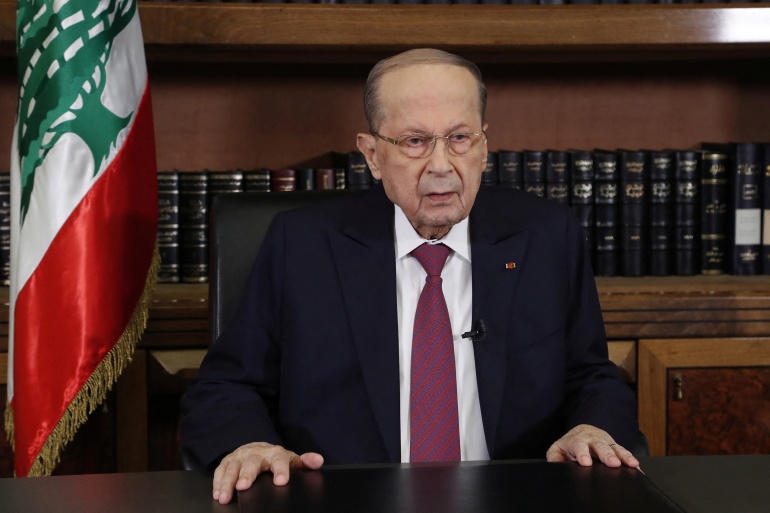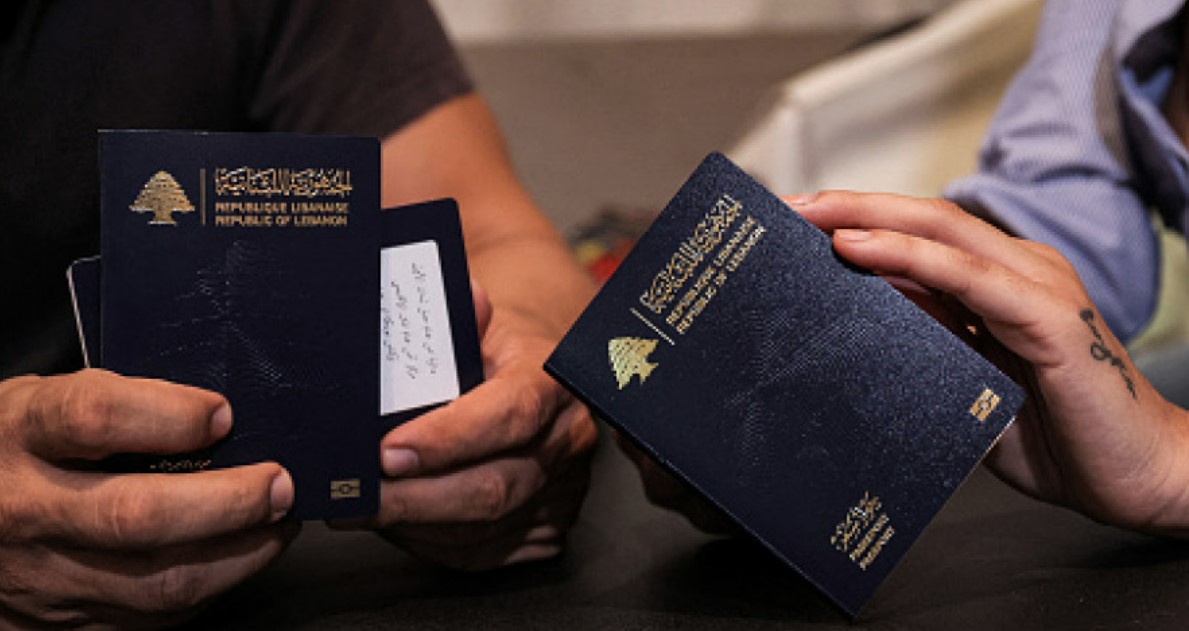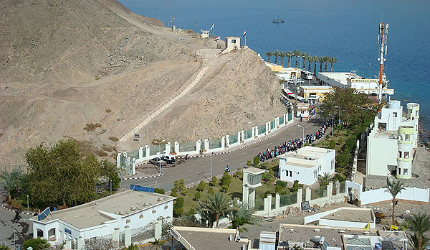
Beirut (AFP) – When Michel Aoun became president in 2016, putting an end to a two-year power vacuum due to political wrangling, he vowed to be the "strong" president Lebanon so desperately needed. But as his mandate draws to a close next week, the country is reeling from an unprecedented economic crisis, with Beirut having been ravaged in 2019 by one of the world's biggest non-nuclear explosions. The blast was preceded by a 2019 mass protest movement that demanded Aoun's departure, along with the rest of Lebanon's entrenched ruling class. "The presidency was a disappointment, even for him," said his nephew, lawmaker Alain Aoun. Yet the 88-year-old leader has repeatedly refused to step down or quit politics, even announcing that he would continue his political fight within his party, the Free Patriotic Movement (FPM), upon leaving office. The former army chief ran for the presidency on a platform of fighting corruption, vowing to become "everyone's father", a uniting leader in a country where power is divided among sects. But he also ran on a sectarian agenda, promising to defend Christian "rights", after the community lost some of its political power at the end of the civil war.
In 2019, mass protests gripped the country as it plunged into a financial crisis dubbed one of the world's worst in recent history by the World Bank. The Beirut port explosion of 2020 further compounded anger against Lebanese leaders blamed for their negligence after tonnes of ammonium nitrate fertiliser caught fire and detonated, killing over 200 people and leaving large swathes of the capital destroyed. "He was subjected to a financial and economic atomic bomb and the explosion in Beirut," his nephew said of Aoun. "Even if he was not responsible for this, he found himself on the frontline."
'To hell'
A short, stocky man who presents himself as Lebanon's saviour, Aoun has often responded to popular discontent with detachment. Amid the nationwide protests in 2019, he went as far as telling Lebanese they should emigrate if they are unhappy from the country he said was headed "to hell". Those formerly in his close circle said he was stuck in denial, with one source painting a picture of a power-hungry leader whose "destructive ambition" meant he was "ready to do anything to become president".

by Fatima Al Mahmoud thenationalnews.com -- -- In May 2021, my life changed when I made the decision to move from Lebanon to the UAE. It wasn’t an easy choice, but it was the obvious one. After an economic collapse, a pandemic and one of the largest non-nuclear explosions in history, there was only so much more I could take. I began interviewing for my current job at The National immediately after the Beirut blast. Aside from wanting to join an esteemed news organisation, I also really wanted a way out of Lebanon. I remember the editors sensing my despair when my internet completely failed me during our second-stage interview. I made it absolutely clear that I wanted to relocate. Of course I dreaded having to leave my family behind to pursue my career. In fact, it’s one of the toughest things I’ve had to do, but one thing brought me solace — I'd think to myself, they can always come visit. Little did I know, I couldn’t have been more wrong.
The plan was for me to move, get my residency and find a house before brining my mother over to help me get settled in. She was meant to help me furnish the apartment from scratch, teach me a few recipes and maybe even cook a few of my favourite meals that I can keep frozen for when I’m craving a taste of home. But for more than a year now, she has been on an endless waiting list to get her Lebanese passport renewed, and the end is far from near. A lack of funds has crippled Lebanon’s public sector and made it increasingly difficult for people to obtain new travel documents. The earliest available appointment on the General Security’s website is in 2024, with thousands of people waiting for their turn after the demand for a passport surged over the past two years. Many are calling my home country an "open-air prison". Somehow it feels fitting. Lebanon's inability to issue passports is only one outcome of decades of corruption and mismanagement.
by middleeastmonitor.com — A Cypriot delegation in Lebanon, on Friday, for talks on maritime border delineation between the two countries said any …

by reuters -- BEIRUT — Lebanese and Israeli leaders finalized a U.S.-brokered maritime demarcation deal on Thursday, bringing a measure of accommodation between the enemy states as they eye offshore energy exploration. Leaders from Lebanon, Israel and the U.S. have all hailed the deal as “historic” but the possibility of a wider diplomatic breakthrough remains slim. As a result, there was no joint signing ceremony. Lebanese President Michel Aoun signed a letter approving the deal at his palace in Baabda in the presence of the U.S. official who mediated the accord, Amos Hochstein. “We have heard about the Abraham Accords,” said top Lebanese negotiator and deputy parliament speaker Elias Bou Saab, referring to the 2020 U.S.-brokered normalization of ties between Israel and the UAE and Bahrain. “Today there is a new era. It could be the Amos Hochstein accord.” Israeli Prime Minister Yair Lapid signed separately in Jerusalem, saying the deal was a “tremendous achievement” that had produced Lebanon’s de facto recognition of Israel. “It is not every day that an enemy country recognizes the state of Israel, in a written agreement, in view of the international community,” Lapid told his cabinet in broadcast remarks.
In a pre-recorded interview aired later on Thursday, Aoun said delineating the boundary would prevent war with Israel and that the full status of the southern border would be resolved later through “dialogue.” But he insisted the accord did not constitute a peace agreement with Israel, after having earlier said the deal was purely “technical” and would have “no political dimensions or impacts that contradict Lebanon’s foreign policy.” Lebanon does not recognize Israel’s right to exist and still considers itself at war with its neighbor, with laws barring contact with Israeli officials. It is not every day that an enemy country recognizes the state of Israel, in a written agreement, in view of the international community. — Israeli Prime Minister Yair Lapid “Confidence-building measure” Lower-level delegations from each country headed to the United Nations’ peacekeeping base at Naqoura along their contested land border, which has yet to be delineated.
Khazen History


Historical Feature:
Churches and Monasteries of the Khazen family

St. Anthony of Padua Church in Ballouneh
Mar Abda Church in Bakaatit Kanaan
Saint Michael Church in Bkaatouta
Saint Therese Church in Qolayaat
Saint Simeon Stylites (مار سمعان العامودي) Church In Ajaltoun
Virgin Mary Church (سيدة المعونات) in Sheilé
Assumption of Mary Church in Ballouneh
1 - The sword of the Maronite Prince
2 - LES KHAZEN CONSULS DE FRANCE
3 - LES MARONITES & LES KHAZEN
4 - LES MAAN & LES KHAZEN
5 - ORIGINE DE LA FAMILLE
Population Movements to Keserwan - The Khazens and The Maans
ما جاء عن الثورة في المقاطعة الكسروانية
ثورة أهالي كسروان على المشايخ الخوازنة وأسبابها
Origins of the "Prince of Maronite" Title
Growing diversity: the Khazin sheiks and the clergy in the first decades of the 18th century
Historical Members:
Barbar Beik El Khazen [English]
Patriach Toubia Kaiss El Khazen(Biography & Life Part1 Part2) (Arabic)
Patriach Youssef Dargham El Khazen (Cont'd)
Cheikh Bishara Jafal El Khazen
Patriarch Youssef Raji El Khazen
The Martyrs Cheikh Philippe & Cheikh Farid El Khazen
Cheikh Nawfal El Khazen (Consul De France)
Cheikh Hossun El Khazen (Consul De France)
Cheikh Abou-Nawfal El Khazen (Consul De France)
Cheikh Francis Abee Nader & his son Yousef
Cheikh Abou-Kanso El Khazen (Consul De France)
Cheikh Abou Nader El Khazen
Cheikh Chafic El Khazen
Cheikh Keserwan El Khazen
Cheikh Serhal El Khazen [English]
Cheikh Rafiq El Khazen [English]
Cheikh Hanna El Khazen
Cheikha Arzi El Khazen
Marie El Khazen